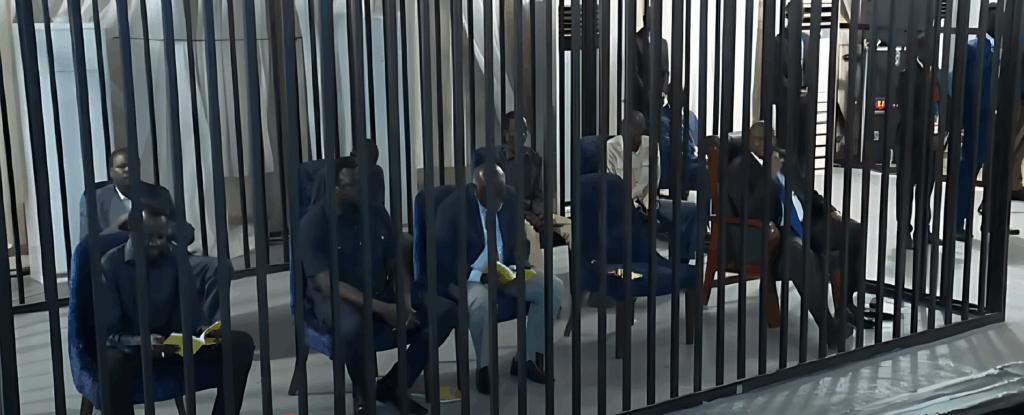Africa-Press – South-Sudan. The trial of suspended First Vice President Dr. Riek Machar and seven senior SPLM-IO officials was adjourned to Tuesday after the accused’s legal team challenged the composition and legitimacy of the Special Court set up to hear the case.
Presided over by Justice James Alala, the proceedings quickly shifted focus when Machar’s defense team lodged a formal objection, describing the court as “incompetent” and lacking jurisdiction to try the opposition leader.
“We object to the establishment of this Special Court,” said Dr. Gari Raymond Lege, the lead defense counsel of Machar.
“Dr. Riek Machar, as First Vice President under Article 103 of the Transitional Constitution, cannot be subjected to proceedings in this forum, which lacks both competence and jurisdiction.”
Lege argued that Machar’s suspension from office was unconstitutional, insisting that under the Transitional Constitution only a two-thirds vote of the Transitional National Legislature could remove a sitting Vice President. He further maintained that, under the 2018 Revitalized Peace Agreement, only a hybrid court has the mandate to prosecute high-ranking officials.
The Hybrid Court for South Sudan (HCSS) was a key provision of the 2015 Agreement on the Resolution of the Conflict in South Sudan (ARCSS) and later reaffirmed in the 2018 Revitalized Peace Agreement (R-ARCSS).
It was envisioned as a special tribunal established by the African Union (AU) in collaboration with South Sudan’s government to prosecute individuals responsible for atrocities committed during the civil war that broke out in December 2013, including those in the SPLM-IG under President Salva Kiir.
“This [special] court was never intended to try individuals like His Excellency Dr. Riek Machar, who remains protected under the peace agreement,” Lege said. “We therefore pray for the immediate discharge and release of Dr. Machar and his colleagues.”
The prosecution, however, dismissed the defense’s objections as baseless. Advocate Ajo Noel Ohisa, speaking for the state, argued that the creation of the Special Court was firmly grounded in law.
“The Constitution and the Judiciary Act of 2008 expressly provide for the establishment of additional courts and tribunals as necessary,” Ohisa said, citing Section 7(f) of the Act and related provisions.
“This court is fully competent to hear the charges. The argument that it lacks jurisdiction is without merit.”
However, Section 7(f) of the Judicial Service Commission Act 2008, under the functions and powers of the council, states that the council can “recommend appointments, promotions and removals of Justices and Judges in accordance with the provisions of the Judiciary Act”, falling short of the establishment of additional courts.
The prosecution indicated it would file a formal written response to the defense’s motion on Tuesday, after which the court is expected to rule on the objection. The proceedings were adjourned after less than two hours of hearing.
For More News And Analysis About South-Sudan Follow Africa-Press






